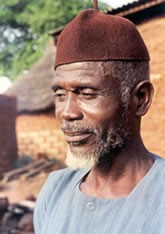Jotoni in Burkina Faso

Photo Source:
Wild West Africa Connection
|
Send Joshua Project a map of this people group.
|
| People Name: | Jotoni |
| Country: | Burkina Faso |
| 10/40 Window: | Yes |
| Population: | 1,800 |
| World Population: | 25,800 |
| Primary Language: | Jowulu |
| Primary Religion: | Ethnic Religions |
| Christian Adherents: | 3.00 % |
| Evangelicals: | 1.60 % |
| Scripture: | New Testament |
| Ministry Resources: | Yes |
| Jesus Film: | No |
| Audio Recordings: | Yes |
| People Cluster: | Mande |
| Affinity Bloc: | Sub-Saharan Peoples |
| Progress Level: |
|
Introduction / History
While a majority of the Jotoni (AKA, Somogho) live in the country of Mali, a small group live in the southwestern part of Burkina Faso. The climate in this region of Africa is very hot and dry. The Jotoni live near one of Burkina Faso's four rivers. There, the vegetation is thicker and the heat is more bearable than in other areas. However, the tsetse fly (which carries sleeping sickness) and the simulium fly (which carries river blindness) live near the rivers. These insects make the river areas almost uninhabitable. The scattered forests also provide a place for the Jotoni to live. These forests are also homes to birds, monkeys, various insects, and hippopotamuses. The Jotoni speak a language called Jowulu.
What Are Their Lives Like?
The Jotoni are primarily farmers. Millet is their staple crop, and peanuts, peas, corn, cotton, peppers, and other vegetables are grown as supplementary crops. About three-quarters of the income of the Jotoni is based on agriculture. The remainder comes from hunting and gathering. Families also raise goats, sheep, chickens, and bees for their milk, wool, meat, and honey. Among the Jotoni, the household is the basic economic unit. The villages are large and usually highly populated. Houses are rectangular with flat roofs, much like those of neighboring tribes. However, Jotoni villages have dome-shaped granaries that rise above the village walls. Each village may have at least 100 of these granaries. Every village has a headman who acts as the authority to family lineages rather than as the authority to individual households. Jotoni society is patrilineal in structure. This means that the lines of descent are traced through the fathers. Private property is inherited by the eldest son, while household property is passed to the younger brother of the father. Married sons attach their households to the household of their father. When a girl marries, the girl's family does not require a "bride-price," as families in other West African tribes do. Instead, the groom gives premarital gifts to the girl's family. The gifts are usually animals such as chickens or goats. Like many other tribes in West Africa, the men sometimes practice polygamy, or the marrying of several wives. Burkina Faso is rich in ethnic diversity, and the country's folklore reflects this. During national occasions, each region--including their region—has their own folklore group. The Jotoni are often at odds with the Mossi tribe, who are located to the east of the Jotoni. There are frequent raids and retaliations.
What Are Their Beliefs?
The great majority of the Jotoni practice various ethnic religions. The Jotoni believe that the "supreme god" is too distant to worship directly and that the only way to worship him is through a spirit. Consequently, they worship statues or other objects that they believe house the spirits. The spirits, in return, will supposedly give the worship to the supreme god on their behalf.
What Are Their Needs?
Few Jotoni have given their lives to Christ, though there are some who identify as Christians. The strongholds of Islam and spirit worship keep them from accepting the only Savior.
Prayer Points
Pray for a spiritual discernment and spiritual hunger among the Jotoni people that will lead them to Jesus Christ. Pray this will be the decade where there is a massive movement to Christ among the Jotoni people. Pray the Lord will give these farmers an excellent harvest this year as a testimony of his power and goodness. Pray for the Lord to thrust out anointed workers to the Jotoni people.